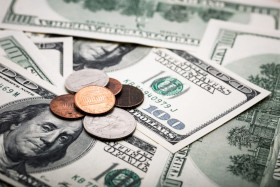The US dollar is trading mixed against its G10 currency rivals midweek following the Federal Reserve‘s completion of its two-day policy meeting. The central bank left interest rates unchanged, and it pledged to keep rates lower for a few more years to support the economic recovery. With rates hovering near zero until at least 2023, how will this impact the greenback?
The Federal Open Market Committee (FOMC) announced that the benchmark fed funds rate would stay in the target range of 0% and 0.25%. Policymakers agreed to leave rates in this range for three more years, or until inflation consistently rises above the 2% target rate.
A month after Fed Chair Jerome Powell confirmed a new inflation approach, the FOMC adopted specific language to emphasize the newest objective.
With inflation running persistently below this longer run goal, the Committee will aim to achieve inflation moderately above 2 percent for some time so that inflation averages 2 percent over time and longer-term inflation expectations remain well anchored at 2 percent. The Committee expects to maintain an accommodative stance of monetary policy until these outcomes are achieved.
It will be appropriate to maintain this target range until labor market conditions have reached levels consistent with the Committeeâs assessments of maximum employment and inflation has risen to 2 percent and is on track to moderately exceed 2 percent for some time.
The Eccles Building also released the latest economic projections, which include a lower gross domestic product (GDP) decline this year, as well as a falling unemployment rate. Looking ahead, the Fed expects 4% GDP growth in 2021, 3% in 2022, and 2.5% in 2023. It expects the jobless rate to slide to 4% by 2023.
Ultimately, the Fed stated that the economic recovery would depend primarily on the coronavirus, noting that “the economy is pinned down by the coronavirus, and cannot achieve full recovery until the health crisis is under better control.”
The leading stock indexes rose on the news, with the Dow Jones Industrial Average leading the way by adding 300 points to just under 28,300. Gold and silver prices barely reacted, rising $6.20 and $0.051, respectively.
In other news, retail sales climbed 0.6% in August, short of the 1% market forecast. The reading is also down from the 0.9% gain in July. Business inventories rose 0.1% in July, up from the 1.1% drop in June. Mortgage applications tumbled 2.5% in the week ending September 11, according to the Mortgage Bankers Association (MBA).
The US Dollar Index, which gauges the greenback against a basket of currencies, rose 0.01% to 93.06, from an opening of 93.05. The index has been clawing back this month, but it is still down 3.5% year-to-date.
The USD/CAD currency pair fell 0.23% to 1.3158, from an opening of 1.3186, at 18:29 GMT on Wednesday. The EUR/USD declined 0.19% to 1.1824, from an opening of 1.1848.
If you have any questions, comments, or opinions regarding the US Dollar, feel free to post them using the commentary form below.
